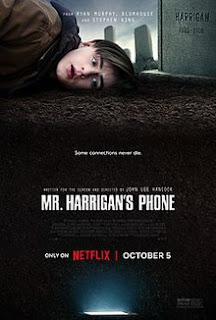Mr. Harrigan's Phone
Mr. Harrigan's Phone
Starring Jaeden Martell, Donald Sutherland, Joe Tippett, Kirby Howell-Baptiste
Directed by John Lee Hancock
Stephen King is best known for his spine-tingling tales of terror, but he's also written some of the most thought-out, deeply character driven coming-of-age stories out there, like the classic "Stand By Me." Sometimes he manages to blend both the macabre and the memorable into something profoundly scary and insightful, and one of those is the novella "Mr. Harrigan's Phone" from his work If It Bleeds. Also as it goes with King's adaptations, however, when they're put to the big screen something gets lost in the translation, such as the case with "Mr. Harrigan's Phone," which would've worked a lot better as a part of an anthology series than a feature-length film.Craig (Jaeden Martell) has spent three days a week for the last five years reading for the elderly but wealthy Mr. Harrigan (Donald Sutherland), who acquired his wealth by being ruthless and by not having anyone close to him - but he takes a shine to Craig, and the two form a deep friendship that goes beyond just Craig's readings. He gifts Craig with a lottery ticket four times a year, and one time Craig wins $3,000, which he uses to buy Mr. Harrigan a phone, showing him how to use it. Not long after, Mr. Harrigan dies, and Craig puts his phone in his pocket before he's buried. Saddened over his passing, Craig calls Mr. Harrigan's phone and is shocked when he gets a text message back, but no one believes that it's from Mr. Harrigan. When Craig is assaulted by a fellow student, he calls Mr. Harrigan's phone again asking for justice, and the bully ends up dead the next day. Thinking Mr. Harrigan is helping achieve vengeance from beyond the grave, Craig struggles with his own guilt as he keeps turning to Mr. Harrigan when other problems arise - and death soon follows.
"Mr. Harrigan's Phone" shines when it deals with Craig's coming-of-age story, but fails to deliver in the scares, as what could've been a very thoughtful study on the dangers of vengeance and retribution, but instead it turns into a cautionary tale about the problems with phones, social media, and the news that over-saturates our senses. It takes a while for the story to really start going, and when it does it feels like it's afraid of its own shadow to really delve into the deeper meaning that the novella told. Instead of facing the dangers of a possible supernatural entity getting revenge, it's about a young man's own struggles with guilt over something that may or may not be his own fault - we never really know for sure.
It had some decent moments, but overall it was a wash and could've been better if it was in the hands of a director like Mike Flanagan, who's a frequent Stephen King director with stellar results like "Gerald's Game" and "Doctor Sleep." Instead it was John Lee Hancock, best known for directing dramas like "The Rookie," "The Blind Side," and "Saving Mr. Banks." To that end, he really tells the story of Craig in a very realistic way, despite the paranormal events occurring around - and because of - him. Jaeden Martell (who also appeared in King's adapted "It") showcases his talent here, struggling with his identity and what's happening around him. You feel his apprehension and his worries after Mr. Harrigan seemingly calls from beyond the grave, and the mental anguish he endures as he feels responsible for what happens afterward, and also struggling with the loss of his mother years earlier that he's never fully faced. Likewise, Donald Sutherland plays Mr. Harrigan with a steely resolve but also the generic "old man" trope when it comes to technology - giving a cringe-worthy speech about how peoples' dependence on phones and free news could end up disastrous - but coming from the veteran actor it's not as bad as it could've been.
Seeing the film as a character study and coming-of-age tale, "Mr. Harrigan's Phone" is a smidgen better than expected, but if you're looking for a classic Stephen King terror tale, it's better to dial another number. Neither really hits the mark despite strong performances, and this is a film you can put on call waiting for another time.
The Score: C




Comments
Post a Comment